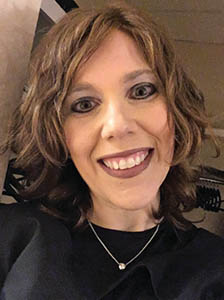

As an educator, I strive to think about the actions I have taken in the past and how they have affected my students, fellow teachers and myself. I previously thought that my talents and abilities were simply fixed traits. If I am talented in a certain area, why do I need to work to improve it? Further, if I do try and fail, then what? For instance, I have a passion in using educational technology to engage, enhance and extend student learning. I have had the pleasure of working as the director of educational technology at SINAI Schools since August. Many of my colleagues will often ask me, “How do you know so much about apps, the SMART Board, and other technology tools?” My response is simple: I am always learning. One can easily assume that if one is proficient in a given area, he or she no longer needs to continue his or her growth. On the contrary—working hard to improve one’s talents and abilities helps one become a better, more successful and passionate educator and leader for others.
President John F. Kennedy said, “Leadership and learning are indispensable to each other.” This is known as a growth mindset. Mindsets are the assumptions and expectations we have for ourselves and others that guide our behavior. They play a powerful role in impacting all aspects of the climate that is created in schools and how effectively we reach and teach students.
In her powerful book, “Mindset: The New Psychology of Success,” Carol Dweck points out the difference between a fixed mindset and a growth mindset.
“In a fixed mindset, people believe their basic qualities, like their intelligence or talent, are simply fixed traits. They spend their time documenting their intelligence or talent instead of developing them. They also believe that talent alone creates success—without effort. They’re wrong.
“In a growth mindset, people believe that their most basic abilities can be developed through dedication and hard work—brains and talent are just the starting point. This view creates a love of learning and a resilience that is essential for great accomplishment.”
I recently had the privilege of attending the YACHAD conference in Baltimore, Maryland, where Dr. Robert Brooks was the keynote speaker. The topic was “The Power of Mindsets: Nurturing Motivation and Resilience in Students.”
At the beginning of his session, Dr. Brooks quoted Steve Jobs, co-founder of Apple.
“Again, you can’t connect the dots looking forward; you can only connect them looking backwards. So you have to trust that the dots will somehow connect in your future. You have to trust in something—your gut, destiny, life, karma, whatever. This approach has never let me down, and it has made all the difference in my life.”
Dr. Brooks explained that when we deal with a child or a colleague, one comment we make to them may affect them the rest of their lives. Highlighting the importance of connecting the dots backwards enables us to appreciate the impact that past events have had on the direction of our professional and personal lives.
He gave the scenario that when we educators are in a classroom and we feel we are losing control, it’s very easy for us to become more controlling. This affects the students by causing them to become angry, as opposed to improving their behavior. No one cares what degree you have; what matters is if you are generally interested in kids. Having a negative mindset is not going to help kids change their behavior.
Dr. Brooks provided us with a few questions to think about:
What guides our interactions with kids?
What do we think motivates kids to learn?
What is our theory of motivation?
How do we create a classroom where every child wants to be?
Every child is born motivated to learn. As educators, it’s our job to find ways to teach our students that cultivate their motivation to learn and enable them to become empowered in their own learning. The key is to make the learning relevant by enabling them to see that there is value in the lesson being taught. It’s imperative that students see that there is a real-world application to what they are learning so they will appreciate the content and will become lifelong independent learners.
Working at SINAI Schools has led me to see things from a completely different perspective. Our students deserve to feel valued and dignified, no matter what their challenges are. My goal is to develop ways of learning through which students will feel a sense of empowerment, ways that motivate them to become lifelong learners and contributors to society.
What are you doing in your classroom to encourage your students to have a growth mindset?
By Penina Simon
Rebecca Penina Simon is the director of educational technology for SINAI Schools. SINAI operates inclusive special education schools for children with a wide range of complex learning or developmental disabilities, as well as programs for adults with developmental disabilities. For additional interesting articles on special education, visit the SINAI blog at www.sinaischools.org/blog.








